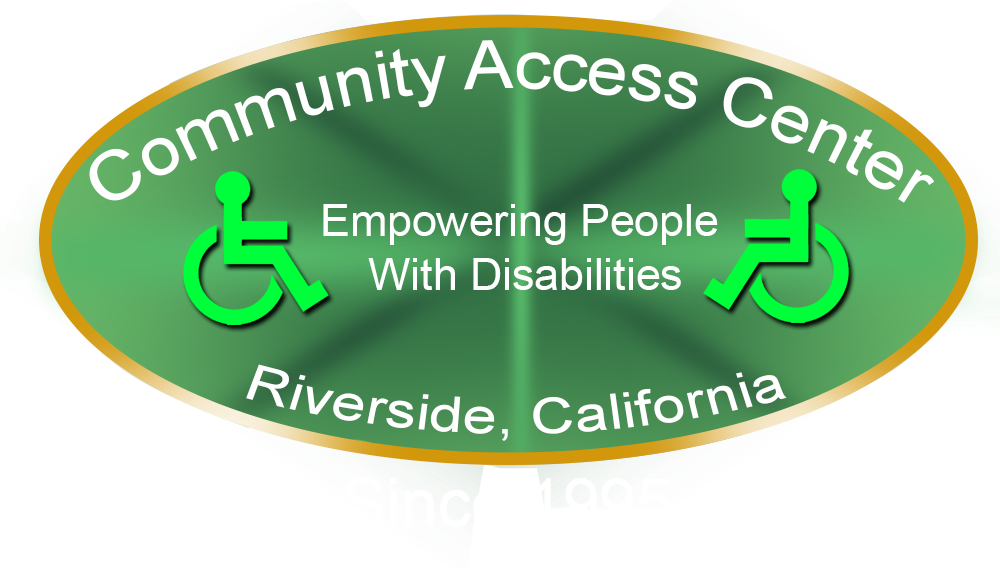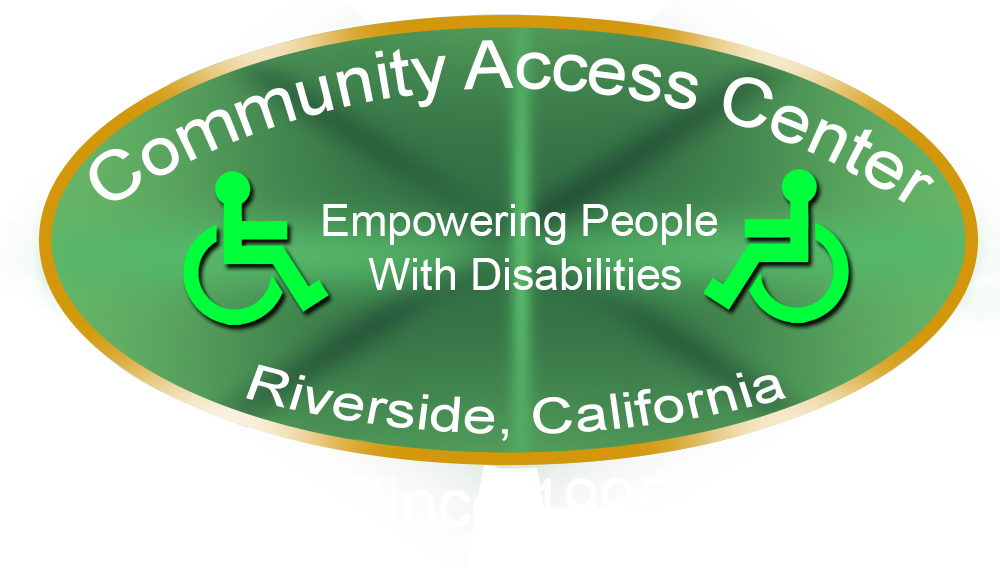
About Us
About Community Access Center (CAC)


Community Access Center is a non-profit organization and one of 29 similar programs throughout the state of California. CAC is a community resource and educator for Riverside County residents with disabilities. Since its establishment, CAC has achieved community recognition and has substantially expanded its services. As a result of our efforts, a branch office opened in 1997 in Indio, with funding from the Department of Education, to serve the Coachella Valley region of Riverside County. To better serve the Coachella Valley region, CAC relocated its offices to Palm Desert in 2006. This was in response to the needs of residents in this rural area, especially the parents of children with disabilities who do not speak English. This office has had a large impact on that under-served region of the county. Community Access Center opened an office in Desert Hot Springs in order to better serve the independent living needs of our county residents living in the city of Desert Hot Springs and nearby rural and unincorporated areas within Riverside County, CA.
Independent Living
The mountain pass and south county regions are receiving independent living services at the CAC satellite office located in the city of Riverside.
As an independent living center, the agency is structured by the following principles:
- Organizational policies and programs are developed, directed, and delivered primarily by people with disabilities
- Services are provided on a cross-disability basis
- The agency operates as a non-residential, non-profit organization
The composition of the center’s staff and board of directors is diverse and reflects the principle of consumer control. The Board of Directors currently consists of eight members and reflects the diversity of the community we serve. CAC has 23 employees. They also reflect the diversity of the community we serve, and 87% have disabilities. Their disabilities include sensory impairment, mobility, psychiatric, developmental, chronic disease, and multiple disabilities.
Serving Our Community
The principle of cross-disability service delivery is confirmed through analysis of Community Access Center’s (CAC) current consumer base. Community Access Center has served over two thousand consumers out of our four offices since 1995. The distribution of disabilities as reported by the consumers includes 41% of individuals with physical disabilities, 13% with mental disabilities, 22% of sensory disabilities (visual and hearing impaired), and 21% of cognitive disabilities. This includes developmental disabilities, learning disabilities, and traumatic brain injuries. 2% of the consumers served reported having multiple disabilities.
Compliance with the third governing principle is evidenced through the center’s observation of the criteria established for tax-exempt nonprofit agencies and defined in Section 501(c)(3) of the Internal Revenue Code. Incorporated in early 1995, Community Access Center received its first AB204 allocation in November of that same year. In over 20 years of operation, the agency has become a recognized presence in Riverside County.
How We Began
The need for independent living services in Riverside County was defined by the Department of Rehabilitation in a State Independent Living Plan adopted in 1986. Funds were initially provided to the Dayle McIntosh Center, an independent living center in Orange County, to operate a branch office in Riverside. At that time, consumers were assisted to acquire and use adaptive devices or equipment, and they were assessed to fulfill their unmet independent living needs and referred to the Department of Rehabilitation’s Independent Living Resource Specialist for support services. Requests from consumers for extended services were numerous. Within months of the establishment of the branch office, additional funding was given to provide core independent living services to consumers in Riverside County.
At a public hearing in San Bernardino held by the State Independent Living Council on June 15, 1995, local residents confirmed the need for an independent living center exclusive to the area. The Department of Rehabilitation issued a Request for Proposal in order to fund the establishment of such an agency and Community Access Center was selected as the grantee.
How Much We've Grown
Community Access Center has gained the support of many organizations and individuals in the community. As a result of our efforts, a branch office opened in 1997 to serve the desert region of Riverside County. This office has had a large impact on that under-served region of the county. The mountain pass region is now receiving independent living services at the CAC satellite offices in Banning and Beaumont, which were opened in October 1999 and in the service area of Community Access Center is the County of Riverside. Approximately 7,300 square miles in size, this area includes both urban and rural communities.
Riverside County currently ranks third among the most rapidly growing county populations in the state, having averaged 3.1% annual growth in the years from 2000 to 2010, and is the most rapidly growing county in the southern half of the state. It is also one of the largest counties in the state. Among Southern California counties, Riverside County ranks first in population growth, with a forecasted average annual growth rate of 3.7% in the years 1996 to 2000. There was an 82% growth in the number of residents in the decade between 1983 and 1993. The estimated number of county residents with disabilities exceeds 190,000 people.
Let Us Help You!
Community Access Center never charges a fee for services provided.
Investigation of discrimination claims and mediation on behalf of people with disabilities in order to resolve conflicts that impede the attainment of needed benefits and services.
Consumer Rights Notification
Every consumer of the Community Access Center has the right to appeal any decision that denies them service. (Please keep in mind that the appeal must adhere to specific guidelines and time constraints; request a copy of the procedure from your service provider) If you desire representation in addressing your concerns or dissatisfaction with the Community Access Center (CAC), you have the right to contact the Client Assistance Program (CAP) for assistance. Contact the CAP at 1(800) 776-5746 (and for the hearing impaired, their TTY is 1(800) 576-9269), and you will be referred to a Client Assistance Program not connected with CAC. This will prevent any potential conflict of interest.
Community Access Center
6848 Magnolia Ave. Suite 150 Riverside, CA 92506
Phone: (951) 274-0358 | Fax: (951) 274-0833
E-Mail: nettec1@ilcac.org
Executive Director
Faustino Alvarez
951-274-0358 ext. 107
E-Mail: execdir@ilcac.org
Programs Director
Maria Alvarez
951-274-0358 ext. 104
E-Mail: pmgr1@ilcac.org
System Change
Pilar Cole
951-274-0358 ext. 111
E-Mail: scadvocate@ilcac.org
Operations / IT Manager
Ramon Martinez
951-274-0358 ext. 105
E-Mail: nettec1@ilcac.org

